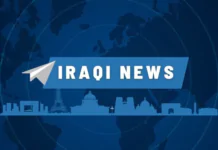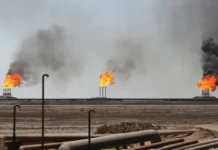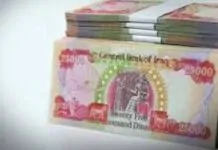The Dollar Continues To Fall Against The Dinar In Baghdad.
Economy | 10:40 – 03/07/2025 Mawazine News – Baghdad The US dollar exchange rate fell on Thursday morning in the markets of Baghdad and Erbil, the capital of the Kurdistan Region.
The dollar price fell on the Al-Kifah and Al-Harithiya stock exchanges to 141,100 Iraqi dinars for every $100, while yesterday, Wednesday, it recorded 141,350 dinars for every $100.
Selling prices fell in exchange shops in the local markets in Baghdad, where the selling price reached 142,000 Iraqi dinars for every $100, and the buying price reached 140,000 dinars for every $100. https://www.mawazin.net/Details.aspx?jimare=263394
Gold Prices Fall Globally
Economy | 03/07/2025 Mawazine News – Follow-up: Gold prices fell in global markets on Thursday as tensions eased between the United States and Vietnam following their conclusion of a trade agreement, while traders awaited US jobs data later in the day for clues on the path of US interest rates.
By 00:29 GMT, spot gold was down 0.3% at $3,345.57 per ounce. US gold futures lost 0.1% to $3,356.60.
US President Donald Trump said on Wednesday that the United States would impose 20% less tariffs on various goods from Vietnam than it had pledged.
The Southeast Asian nation is the tenth-largest trading partner of the United States.
Meanwhile, US and Indian negotiators sought to finalize a deal to reduce tariffs before a July 9 deadline set by Trump.
Trump showed no signs of extending the negotiating deadline despite stalled discussions with Japan, another major trading partner, but expressed optimism about a deal with India.
Markets are currently pricing in a 66 basis point cut in US interest rates this year, between September and December.
Among other precious metals, spot silver fell 0.6% to $36.36 an ounce, platinum lost 0.5% to $1,412.13, and palladium fell 0.4% to $1,150.28. https://www.mawazin.net/Details.aspx?jimare=263390
Slight Rise In Iraqi Oil Prices On Global Markets
economy | 03/07/2025 Baghdad Today – Baghdad Iraqi oil prices recorded a slight increase during daily trading on Thursday in the global market.
According to data reviewed by Mawazine News, Basra Medium crude recorded $68.18 per barrel, while Heavy crude recorded $65.18 per barrel, with a change of +0.23 for both.
The data also showed global oil prices, with British Brent crude recording $68.57 per barrel, while US West Texas Intermediate crude recorded $66.92 per barrel. https://www.mawazin.net/Details.aspx?jimare=263389
Statistics: A Slight Decrease In Iraq’s Domestic Public Debt.
Economy | 03/07/2025 Mawazine News – Baghdad – The Central Bank of Iraq announced, on Thursday, a slight decrease in the domestic public debt at the end of April 2025.
The bank said in an official statistic reviewed by Mawazine News that “Iraq’s domestic public debt decreased at the end of April of this year to reach 85 trillion and 503 billion Iraqi dinars, down from 85 trillion and 536 billion dinars in March.”
The bank added that “the decrease was a result of the repayment of loans from financial institutions, which amounted to 19 trillion and 119 billion dollars, after it was 19 trillion and 152 billion dollars.”
He pointed out that “the remaining debts are owed by the Ministry of Finance, amounting to 756 billion dinars, and treasury transfer debts at the Central Bank and commercial banks, amounting to 51 trillion and 30 billion dinars, in addition to treasury transfers on the account of the Ministry of Finance amounting to 2 trillion and 30 billion dinars, and national term debts due to farmers amounting to 12 trillion and 568 billion dollars.” https://www.mawazin.net/Details.aspx?jimare=263396
Chaos And Sole Control… Who Is Behind The National Bank’s Monopoly On Foreign Remittances?
Economy 2025-07-03 | 830 views Alsumaria News – Economic The banking sector in Iraq has recently witnessed a surge in popular discontent and political controversy following the National Bank of Iraq‘s dominance of remittances from abroad.
This has led to the exclusion of several local banks from this vital sector, causing real crises for citizens and raising widespread questions about the motives behind this monopoly and who is behind it.
A sudden decision… and a mysterious exclusion
The story began when a sudden central decision was made to assign the responsibility for foreign remittances to the National Bank of Iraq.
This move, observers described as having implications that transcended technical or regulatory considerations, was particularly significant after the exclusion of well-known Iraqi banks that had been performing this role with relative efficiency.
Informed sources revealed that the decision was made under pressure from influential figures seeking to strengthen their financial influence within the banking sector, exploiting the so-called “financial window system,” which regulates the receipt of remittances.
Sources indicate that these figures share common interests with some members of the National Bank‘s senior management, opening the door to potential financial and administrative corruption.
Monopoly disrupts the market… and citizens pay the price
Since the National Bank of Iraq took over remittance management, receiving offices in Baghdad and other governorates have witnessed unprecedented congestion and frequent delays,
not to mention technical problems and unprofessional behavior by some employees, according to citizen complaints.
Citizen (K.N.), one of the affected people, confirmed to Sumaria News , “After the National Bank took over the remittances, I went to collect my remittances and I kept moving from one office to another because each employee sent me to another,” explaining that
“the current administration does not organize the work and we need to facilitate procedures for citizens, not complicate matters.”
Citizen Abu Ali complained about the poor technical services, telling Sumaria News, “Since the day the National Bank took over the remittances, the application has become even more dysfunctional.”
He stated that “the application stops repeatedly, transfers are delayed or do not arrive, and if a malfunction occurs, there is no one to respond, in addition to the endless excuses.”
Substandard customer service
There have been numerous complaints about poor customer treatment at bank branches,
sparking a wave of anger on the street.
Citizen (H.A.) said, “When I went to the bank to inquire about a transfer that arrived in my name,
I was surprised by the way some employees treated me,” explaining that “this is worrisome.”
Employee (J.S.) stated, “I received a transfer through Al-Ahli Bank, after reviewing and postponing the appointment more than once,” explaining that “the customer is being neglected, as if he is forced to endure the mismanagement and delays.”
Delayed remittances… losses and suffering
Delays in remittances have become an almost daily occurrence,
causing economic damage to many citizens who rely on these funds to make ends meet.
“I called customer service to inquire about a delayed transfer, but there was no response,” Y.M. said. He continued,
“When they do respond, the response is general and useless,” noting that “since Al Ahli Bank took over the remittances, the problems have increased and there are no real solutions.”
Citizen (A.D.) describes the situation as a “real crisis,” noting, “When I receive a remittance from abroad through Al-Ahli Bank, there is definitely a delay, and it does not arrive on the same day.”
He stressed that “this causes us embarrassment due to the financial obligations we have,” calling for other Iraqi banks to be allowed to conduct remittances and not for the National Bank to monopolize them.
Unanswered questions… and regulatory authorities remain silent
In light of this critical situation, citizens and those interested in financial affairs are raising questions about the entity that made the decision to restrict remittances to the National Bank, and why other banks that provided acceptable services were excluded.
Why don’t regulatory bodies, such as the Central Bank of Iraq and the Integrity Commission, investigate the reasons behind the decision?
Economists warn that “the continuation of this monopoly will lead to financial distortions in the remittance market, pressure on citizens, and a collapse in public confidence in the local banking sector.”
Calls for a transparent investigation
Economists are calling for “a transparent investigation into the allocation of remittances to the National Bank, and for any party that manipulated banking competition or led to the exclusion of other Iraqi banks to be held accountable.”
They are also calling on the Central Bank to “urgently intervene and redistribute the remittance file to qualified banks according to standards of efficiency and fairness.”
https://www.alsumaria.tv/news/economy/532189/فوضى-وتحكم-منفرد-من-يقف-وراء-احتكار-الحوالات-الخارجية-للمصرف-الأهلي؟
For current and reliable Iraqi news please visit: https://www.bondladyscorner.com/im






